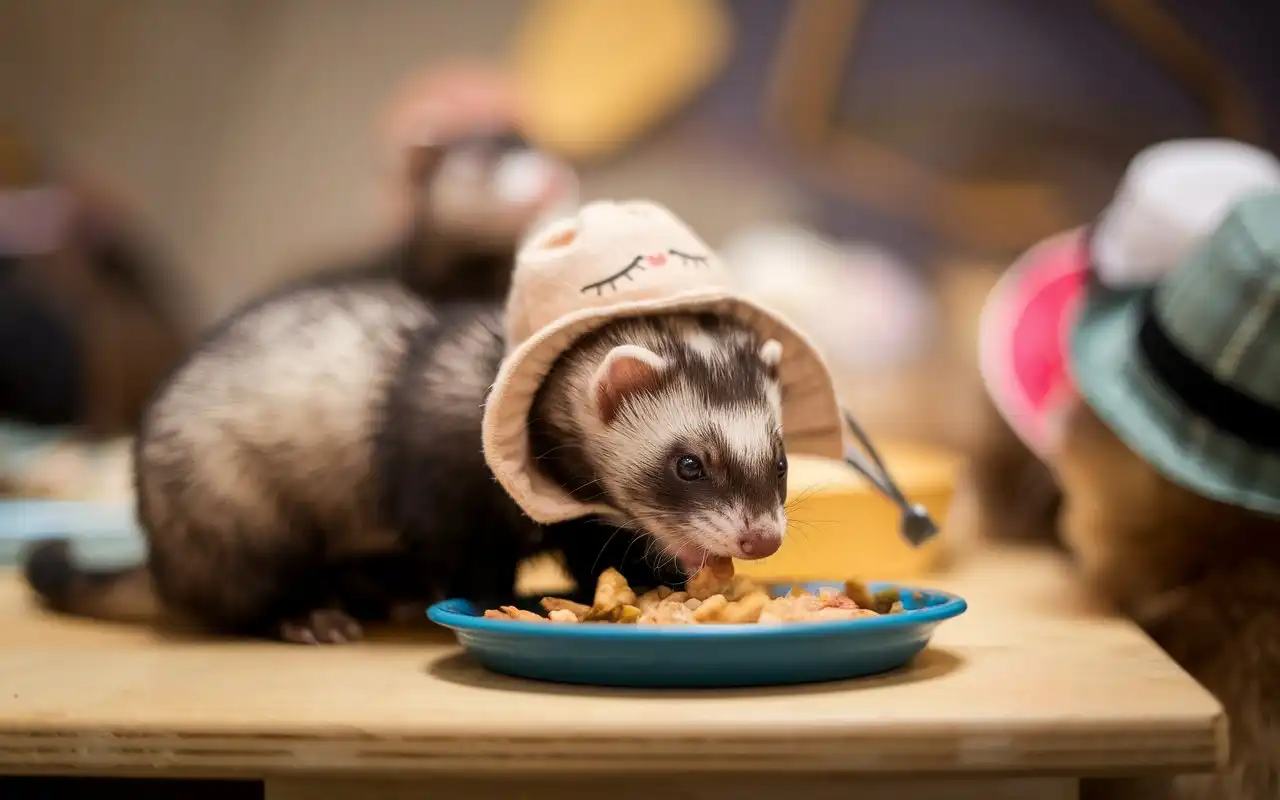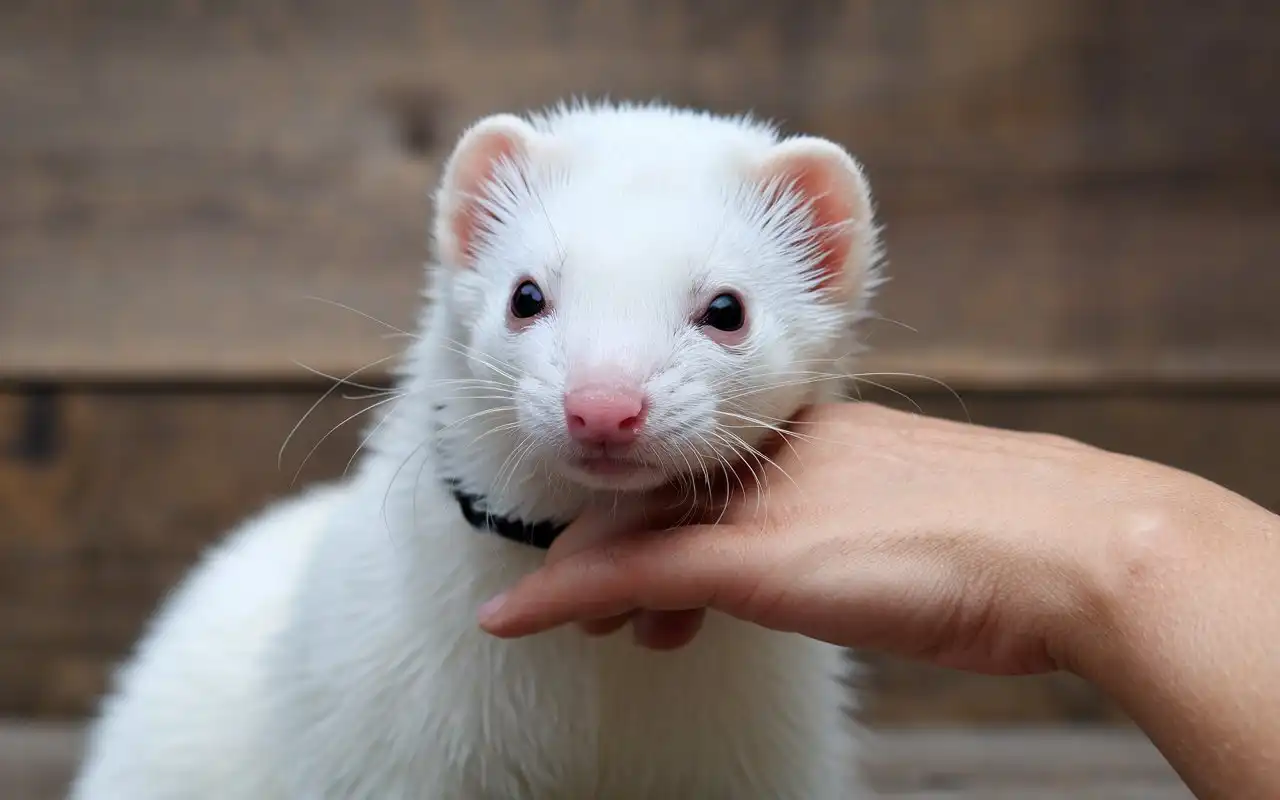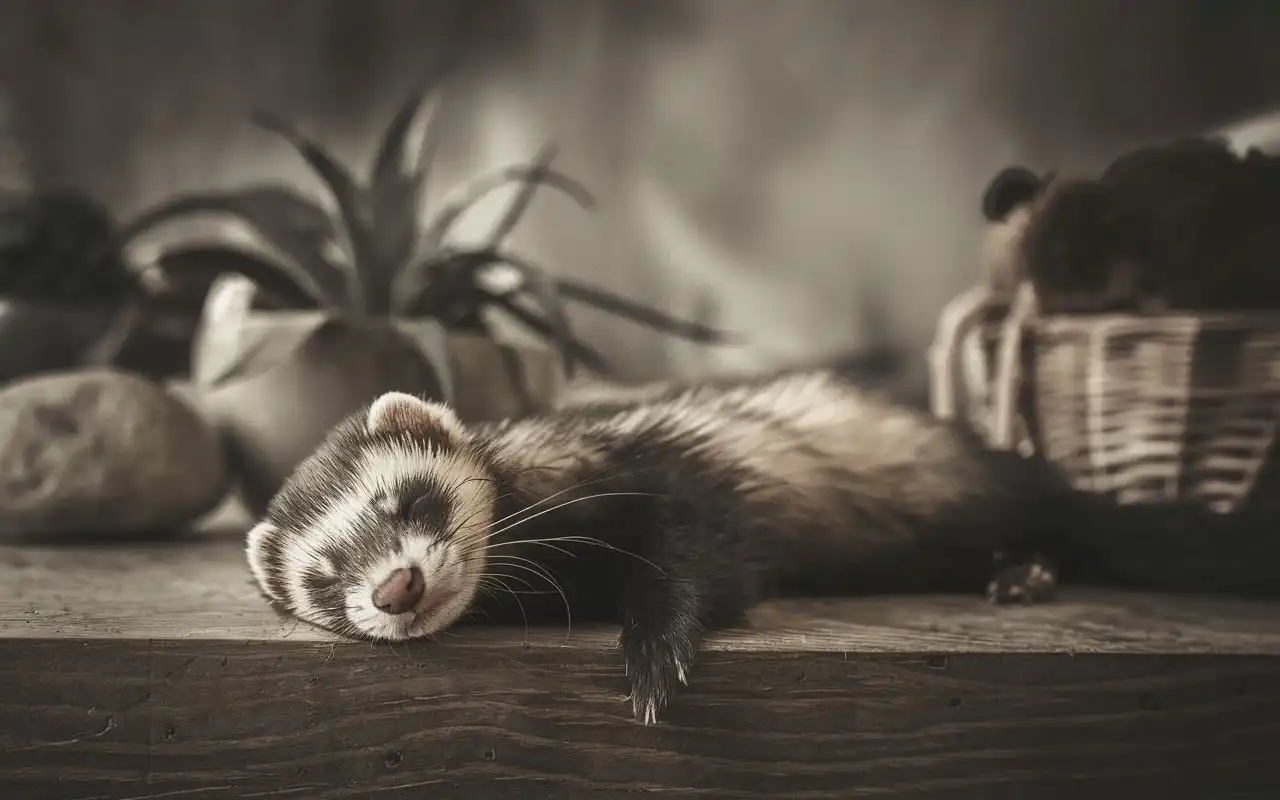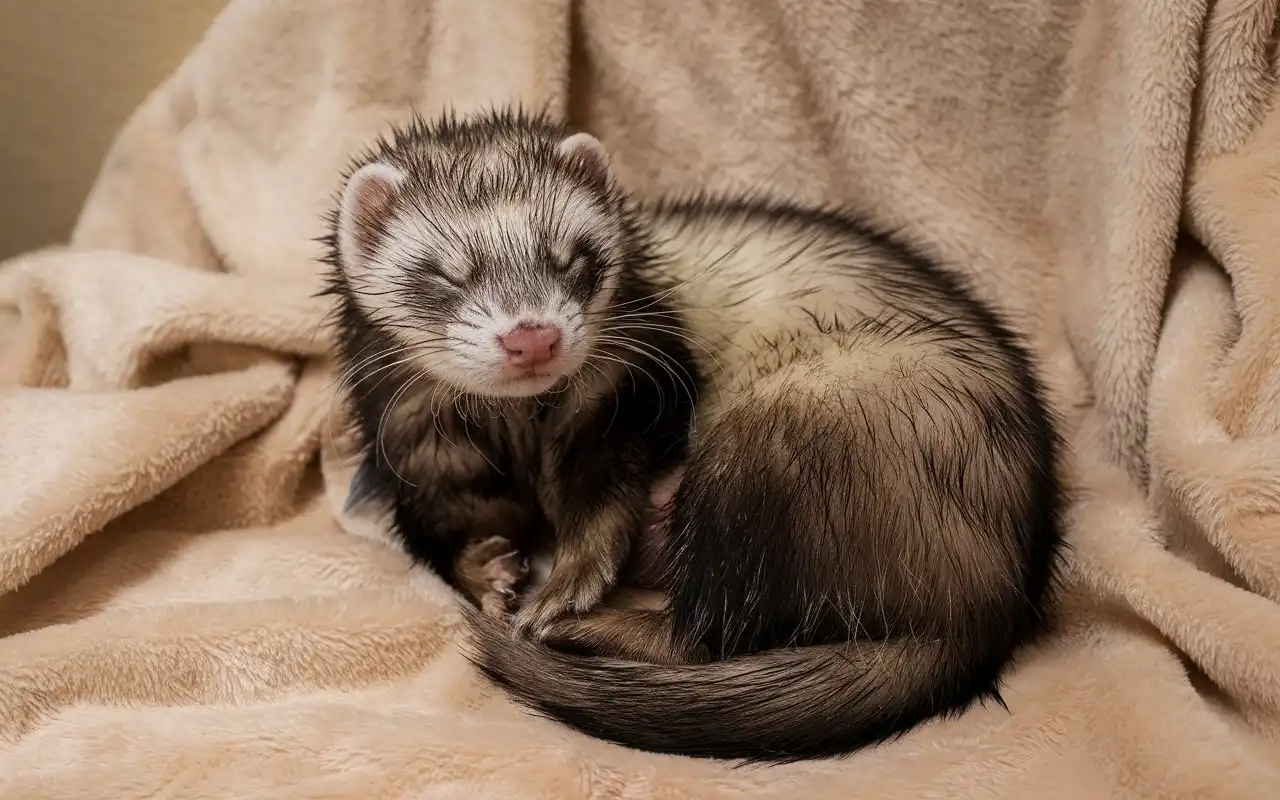A perfect diet is key to your ferret’s health and happiness. It keeps them energetic, too. Ferrets have unique diets. Proper nutrition can help them live longer, healthier lives. Ferrets are obligate carnivores. Their diet must be high in protein and fat, with few carbs. In this guide, we’ll explore everything you need to know to create the ideal ferrets diet.
Table of Contents
Understanding Ferrets’ Nutritional Needs
The Carnivorous Nature of Ferrets
Ferrets are obligate carnivores. They need a high-protein diet, rich in animal foods, to thrive. Unlike omnivorous pets, ferrets need a meat-based diet. It is essential for their nutrition. In the wild, they hunt and consume whole prey, such as rodents, rabbits, and small birds. Their digestive systems can efficiently process these animal proteins. This lets them extract the nutrients they need for good health. Ferrets have a specialized digestive system. This means they lack enzymes to break down plant-based foods. So, a meat-based diet is not just beneficial but essential for their health.
Why Ferrets Require High-Protein Diets
Ferrets have a fast metabolism. They burn calories quickly. So, they need a high-protein diet to meet their energy demands. Without adequate protein, ferrets can lose muscle mass, leading to weakness and fatigue. Also, protein is vital for many body functions. It helps repair tissue, supports the immune system, and makes hormones. A diet that is 32-38% protein from animal sources, like chicken, turkey, or lamb, is essential for a healthy, active ferret. Neglecting protein can harm your ferret’s health. So, prioritize protein-rich foods in their diet.
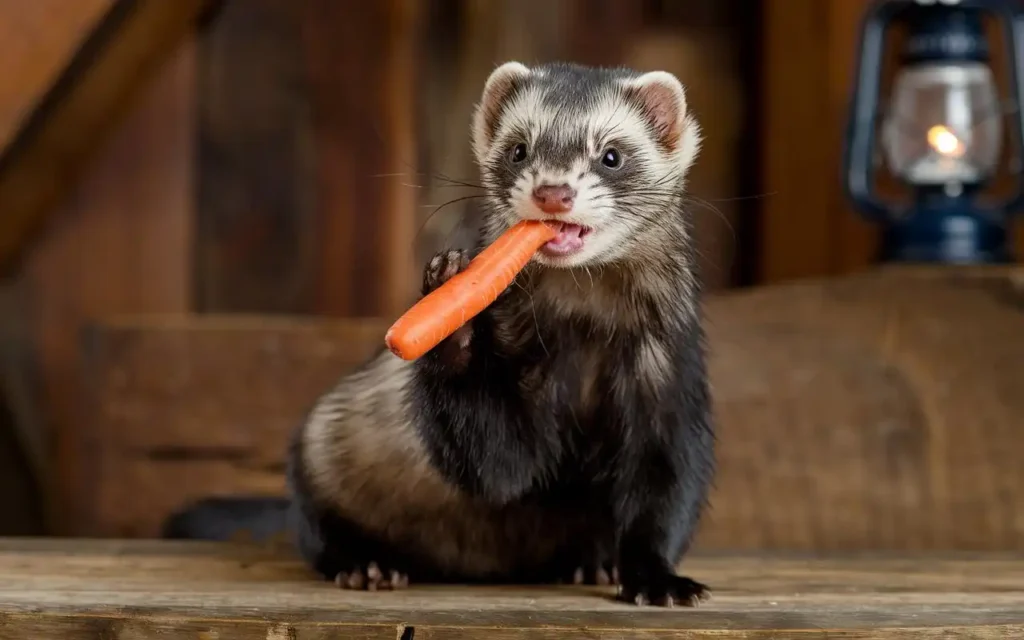
Essential Nutrients for a Ferrets Diet
Proteins: The Foundation of a Ferrets Diet
Protein is undeniably the cornerstone of a ferrets diet. This macronutrient is vital for muscle development and tissue repair. It supports overall growth. Ferrets require high-quality protein sources that provide all essential amino acids. Animal proteins, such as those from chicken, turkey, lamb, and even certain fish, are particularly beneficial. When selecting ferret food, look for products that list meat as the first ingredient and contain minimal fillers like grains or corn. A high-protein, balanced diet keeps your ferret healthy and supports their energy.
Fats: Energy Sources and Skin Health
Fats are vital in a ferrets diet. They provide energy for their active lifestyle. Healthy fats, especially from animals like chicken and fish, fuel their energy. They also promote healthy skin and a glossy coat. Ferrets require around 15-20% fat in their diet to support vital organ functions and maintain overall health. However, choose the right fats. Too much saturated fat can cause obesity and other health issues. Ensuring a balanced intake of fats will help keep your ferret healthy and energetic.
Carbohydrates: Limited Role in a Ferrets Diet
Ferrets can’t tolerate carbs. A high-carb diet can cause weight gain and digestive issues. Unlike other pets that thrive on grain-based diets, ferrets need low carbs. Limit them to 3-4% of their diet. Too many carbs can disrupt their metabolism. This can cause serious health issues, like obesity and insulinoma. It’s a common ferret illness caused by insulin-producing tumors. It’s best to focus on protein and fat in your ferret’s food. Limit carbohydrates. This guarantees they receive the nourishment they require.
What Should Be in a Ferrets Diet?
Recommended Foods
To create a balanced Ferrets Diet, focus on incorporating high-quality, animal-based proteins. Commercial ferret foods that clearly list meat as the primary ingredient are optimal choices. Use products made for ferrets. They meet their unique nutritional needs. Additionally, raw or cooked meats, eggs, and certain organ meats, such as liver or heart, can be excellent additions to your ferret’s meals. These foods provide essential nutrients and variety to their diet. When choosing food, it’s crucial to prioritize freshness and quality to ensure your ferret’s health.
Commercial Ferret Food vs. Homemade Diets
Commercial ferret food is often the most convenient option for pet owners. These products are made to meet ferrets’ dietary needs. They ensure a balanced intake of nutrients. However, some owners prefer homemade diets to provide more variety and control over ingredients. If you prepare homemade meals, consult a vet or a ferret nutritionist. It’s vital to meet your ferrets dietary needs. It’s essential to create a balanced diet that includes all necessary proteins, fats, vitamins, and minerals to keep your ferret healthy.
Foods to Avoid in a Ferrets Diet
Harmful Foods for Ferrets
Some foods are toxic to ferrets. Avoid them at all costs. Among these, chocolate and caffeine are particularly dangerous, as they can lead to serious health issues or even death. Alcohol is equally harmful and should never be given to ferrets. Dairy products are also problematic. Many ferrets are lactose intolerant. They can get an upset stomach. Also, processed human foods like chips and cookies are bad for ferrets. They can cause obesity and other health issues. It’s crucial to educate yourself on safe and unsafe foods to keep your ferret happy and healthy.
Common Mistakes in Feeding Ferrets
One common mistake among ferret owners is feeding a diet too high in carbohydrates. Many pet owners may mistakenly believe that treats such as bread, grains, or sugary snacks are suitable for their pets. Unfortunately, these foods can cause serious health issues. They include obesity and insulinoma, a condition that affects many ferrets. Also, some owners may not vary their ferrets diet. This can cause nutritional deficiencies. It’s vital to research and understand your ferret’s dietary needs to avoid these common pitfalls and ensure they receive the best care possible.

Ferrets Diet and Hydration
Importance of Water in a Ferrets Diet
Hydration is an often-overlooked but critical aspect of any ferrets diet. Ferrets should always have access to fresh, clean water. Dehydration can lead to serious health problems, particularly in hot weather or if your ferret is consuming a dry food diet. In addition to drinking water, ferrets may also receive some hydration from moist foods or broth. It’s essential to monitor their water intake and ensure they stay adequately hydrated to support their overall health.
Tips for Keeping Ferrets Hydrated
To ensure your ferret stays hydrated, make sure their water dish or bottle is always full. Ferrets drink often, so check their water supply several times a day. If your ferret isn’t drinking enough, try adding a bit of unseasoned chicken broth to their water. This may encourage them to drink more. Also, consider a water bottle for small animals. It will be better at preventing spills and keeping the water clean.
Creating a Feeding Schedule for Ferrets
How Often to Feed Your Ferret
Ferrets have fast metabolisms, meaning they need to eat frequently to maintain their energy levels. It’s recommended to offer small meals throughout the day rather than just feeding once or twice. Ideally, you should feed your ferret 6-8 times per day, allowing them access to food at all times. This feeding schedule mimics their foraging behavior. It keeps their energy levels steady all day.
Portion Control and Timing
Free-feeding is common for ferrets. But, it can cause overeating and obesity. So, monitor their portion sizes. If you opt for specific meal times, aim for small portions that provide a balance of protein and fat. You can also rotate between different protein sources to provide variety and prevent dietary boredom. Observing your ferret’s weight and overall health will help you adjust their portions as necessary. Weigh your ferret regularly. It will help you check their weight. Then, you can adjust their diet if needed.
Ferrets Diet for Young Ferrets (Kits)
Special Nutritional Needs for Growing Ferrets
Young ferrets, also known as kits, have special nutritional needs that differ from those of adult ferrets. Kits grow rapidly in their first few months. They need more protein and fat to fuel their development. A diet with at least 40% protein and 20% fat is best for kits. It will support muscle growth, bone development, and energy needs. It’s essential to offer them food that is easy to digest since their digestive systems are still maturing. Kits have small stomachs, but they require frequent meals to keep their energy levels high. So, free-feeding or small meals throughout the day ensures they always have food when needed.
Best Foods for Young Ferrets
For young ferrets, commercial ferret food specifically formulated for kits is often the best choice. These foods are designed to provide the right balance of nutrients to support their rapid growth. High-quality kitten food can also be a good alternative due to its high protein and fat content. You can also introduce raw or cooked meats into their diet, such as chicken, turkey, or lamb, to provide variety and essential nutrients. Always ensure the meat is fresh and properly prepared to avoid any risk of foodborne illness.


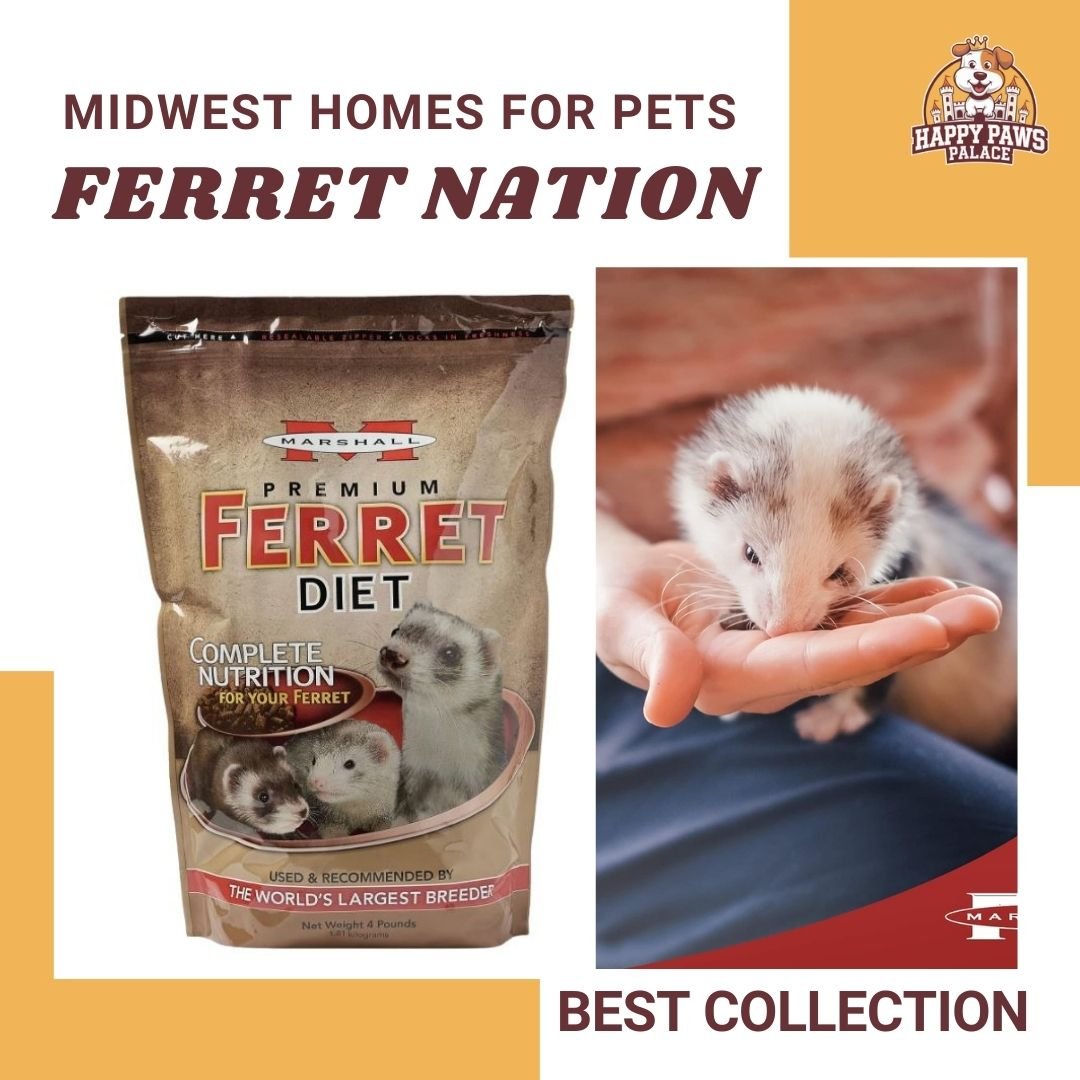
Diet for Adult Ferrets
Maintaining Energy and Health in Adult Ferrets
Once ferrets reach adulthood, their dietary needs shift slightly. While they still require a diet high in protein and fat, their growth slows down, and their energy levels stabilize. The focus of an adult ferrets diet is on maintaining energy and supporting overall health. Adult ferrets are typically very active, so their diets should support their metabolism. A high-protein diet (around 32-38%) is still necessary to keep their muscles strong, while fats (15-20%) provide the energy they need to stay active. A balanced diet is key. It must provide essential vitamins and minerals. This prevents deficiencies that can cause health issues later.
Adjusting Diet Based on Activity Level
Just like people, ferrets have varying activity levels. Highly active ferrets, especially those that play or have big homes, may need more calories to fuel their busy lifestyles. In contrast, ferrets that are less active or spend more time in their cages might require fewer calories to avoid weight gain. You can adjust the portion sizes or slightly tweak the fat content in their diet based on how active they are. It’s also helpful to monitor their weight regularly to ensure they are neither gaining too much nor losing weight unexpectedly.
Diet for Senior Ferrets
Age-Related Changes in Ferret Nutrition
As ferrets age, their dietary needs change. Senior ferrets, those 4-7 years or older, age. They have a slower metabolism, less energy, and some health issues. These changes mean they may require fewer calories to prevent weight gain, but it’s still important to maintain the quality of their diet. Protein remains a crucial component of their diet, as it helps prevent muscle loss, which can occur as ferrets age. A slight reduction in fat can help prevent obesity. It is more common in senior ferrets due to their reduced activity.
Ensuring Optimal Health for Aging Ferrets
Also, adding certain supplements to senior ferrets’ diets can help. It can maintain their health, along with adjusting their fat intake. Omega-3 fatty acids, found in fish oil, can support joint health, reduce inflammation, and keep their skin and coat in good condition. You might also try multivitamins for aging pets. They can ensure your ferret gets all the essential nutrients. A vet can help you decide if your aging ferret needs supplements, like glucosamine for joint health.
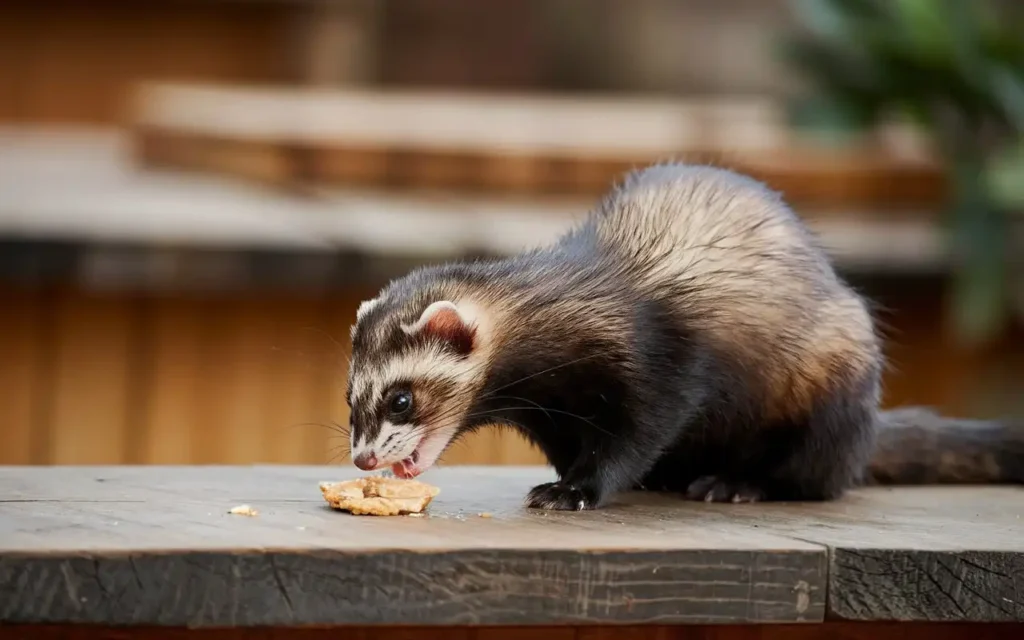
Supplements in a Ferrets Diet
When and Why Supplements Are Necessary
Supplements are not always necessary in a ferrets diet, but there are times when they can be beneficial. If your ferret has specific health issues, like digestive problems, joint pain, or dry skin, certain supplements can help. For example, ferrets with digestive issues might benefit from probiotics. They support gut health and improve digestion. Ferrets with poor skin or coats could benefit from omega-3s. They promote healthy skin and reduce dryness. However, supplements should only be given under the guidance of a veterinarian to ensure they are safe and appropriate for your pet.
Types of Supplements for Ferrets
There are a variety of supplements that can be included in a ferrets diet to enhance their overall health. Fish oil, rich in omega-3 fatty acids, helps keep their coat shiny and supports heart health. Taurine is an essential amino acid. It’s vital for ferret heart function. Some ferret foods might not have enough. So, a taurine supplement is a good choice. Other options are calcium supplements. They are for older ferrets or those on a raw diet. They help to ensure strong bones. Multivitamins designed specifically for ferrets can also help fill any nutritional gaps in their diet.
Raw Food Diets for Ferrets
Benefits and Risks of Raw Food Diets
Raw food diets have gained popularity in recent years because they more closely resemble the natural diet of wild ferrets. Feeding raw meat provides ferrets with high levels of protein and fat without the fillers often found in commercial foods. Raw diets can improve coat condition, increase energy levels, and reduce stool volume. However, raw feeding has risks. It may lead to bacterial contamination, like salmonella or E. coli. Raw food needs to be handled carefully to ensure it is safe for your ferret. Proper storage and preparation are key to minimizing these risks.
How to Carefully Make Raw Cuisine for Ferrets
If you choose to feed your ferret a raw diet, it’s essential to source high-quality, human-grade meats. Meat should be stored in the freezer to kill any potential parasites before being thawed and served. Always wash your hands and any surfaces or utensils that come into contact with raw meat. Raw diets can include muscle meats, organs (such as liver or heart), and bones. It’s also important to balance the diet with vitamins and minerals. You can do this by using supplements or feeding whole prey, like mice or chicks.
Common Health Issues Linked to Poor Diet
Obesity in Ferrets
Obesity is one of the most common health problems linked to poor diet in ferrets. Feeding your ferret a diet high in carbohydrates or overfeeding them can lead to excessive weight gain. Obesity in ferrets raises the risk of serious health issues. These include insulinoma (a pancreatic tumor), heart disease, and joint problems. To prevent obesity, feed your ferret a high-protein, low-carb diet. Avoid sugary or high-calorie treats. Regular exercise and monitoring their weight can also help keep obesity at bay.
Gastrointestinal Issues from Improper Diets
Ferrets are prone to gastrointestinal problems if they are fed an inappropriate diet. Foods that are hard for ferrets to digest, like grains, dairy, and processed human foods, can cause diarrhea, bloating, and vomiting. In some cases, a bad diet can cause serious issues. These include gastrointestinal blockages and inflammatory bowel disease (IBD). To avoid these issues, feed your ferret a diet rich in animal-based proteins and fats. Only give them food made for their unique dietary needs.
Transitioning Your Ferret to a New Diet
How to Safely Change Your Ferret’s Diet
Switching your ferret to a new diet requires a slow and gradual process to avoid gastrointestinal upset. Mix a small portion of the new food with your ferret’s food. Gradually increase the new food over 7-10 days. This method helps your ferret’s digestive system adjust to the new ingredients. It prevents diarrhea and loss of appetite. If your ferret is particularly picky, the process may take a bit longer, but patience is key to ensuring a smooth transition.
Avoiding Stress During Diet Changes
Ferrets can be sensitive to change, and switching their diet can cause stress if not handled properly. To minimize stress, try to maintain a consistent feeding routine and avoid making sudden changes. Giving treats or playing with your ferret at mealtime can create a positive link with the new food. Watch your ferret during the transition period. Make sure they eat enough. Look for signs of distress, like excessive scratching, lethargy, or changes in stool.
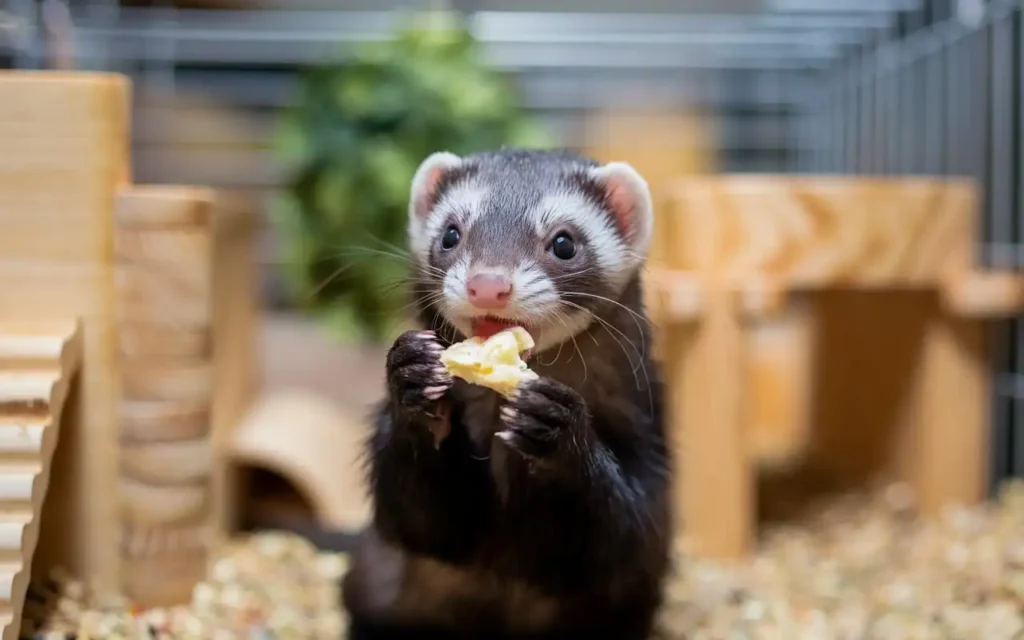
Conclusion
A balanced, well-crafted diet is vital for your ferrets diet, energy, and longevity. Feed your ferret high-quality, animal-based proteins. Limit carbs. Keep them hydrated. This will give them the nutrition they need to thrive. No matter your diet choice, know your ferret’s needs. It’s significant to their vitality and delight.

